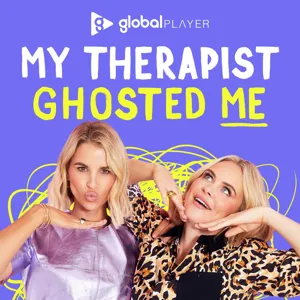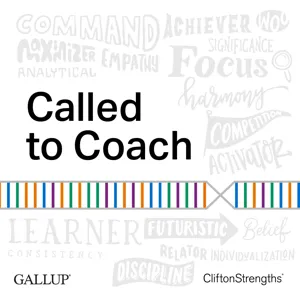Podcast Summary
The importance of saying no and prioritizing ourselves: Recognize the habit of people-pleasing and learn to say no when necessary in order to regain control of our lives and prioritize our own happiness.
Many of us have a habit of people-pleasing and always saying yes to others, even when it goes against what we truly want. This can have a negative impact on our well-being and make us feel disconnected from ourselves. Dr. Neha Sangwan, a medical doctor and researcher, emphasizes the importance of recognizing this habit and learning to say no when necessary. By doing so, we regain control of our lives and become better connected with our own desires and needs. It is essential to prioritize ourselves and our own happiness rather than constantly worrying about what others think.
Navigating Life's Currents: Finding Direction and Balance: Prioritizing our own authenticity and listening to our hearts while still valuing others can help us find our true selves in a world that often pulls us in different directions.
We often become like driftwood in the ocean, going in whatever direction the world is pulling us. This can lead to feeling overwhelmed, ungrounded, and disconnected from ourselves. It's important to become more like a sailboat with a rudder, influenced by outside forces but also charting our own course. We shouldn't anchor ourselves and be unable to move, but rather find a balance where we have input into the direction we're moving. People pleasing is when we give up what matters to us in order to please others or avoid conflict. Ultimately, we should prioritize listening to our own hearts and making decisions that align with our true selves, while still caring about others and seeking belonging.
The Impact of Early Experiences on Personal Growth: Our early experiences shape our resilience and adaptability, highlighting the importance of empathy and support in helping others navigate challenging circumstances.
Our early experiences and interactions shape who we become as individuals. Neha Sangwan's experience of being sent to live with her grandparents at a young age had a profound impact on her. It left her feeling confused and abandoned, constantly searching for the love and presence of her grandmother and grandfather. This emotional turmoil eventually led her to develop a strong sense of resilience and adaptability. She learned to adjust to her surroundings and become attuned to the needs and expectations of others. This early lesson in navigating discomfort and uncertainty became a foundation for her personal and professional growth. It reminds us of the importance of understanding the long-lasting impact of our actions and the need for empathy and support in helping others navigate challenging circumstances.
The Impact of Childhood and Parental Messaging on Emotions and People Pleasing: Our childhood experiences and the messages we receive from our parents profoundly influence our ability to manage emotions and the tendency to people please. It is crucial to recognize and address these patterns to prioritize our own well-being.
Our childhood experiences and the messaging we receive from our parents can have a lasting impact on our ability to manage our emotions and our tendency to people please. Neha Sangwan, a medical doctor, shares her own experience of growing up in an Indian community where success was often defined by being a doctor or engineer. She recalls how she disconnected from herself and sought validation from others, leading to a cycle of people pleasing. This pattern of behavior is common and can result in constant stress, irritability, and exhaustion. It is important to recognize these patterns and understand how our past experiences shape our present behaviors. By acknowledging and addressing the root causes, we can begin to break free from people-pleasing and prioritize our own well-being.
The Impact of People-Pleasing on Mental and Physical Health: Constantly prioritizing others' happiness and avoiding conflict can lead to long-term physical and emotional consequences. By addressing our own needs and healing past wounds, we can create a more fulfilling and authentic life.
Constantly putting others first and avoiding conflict may seem easier in the short term, but it can have significant physical and emotional impacts over time. By prioritizing others' happiness and not addressing our own needs, we may find ourselves feeling unfulfilled and burdened with responsibilities. Ignoring conflicts or discomfort may temporarily alleviate stress, but it only allows the issues to grow bigger and change location. This pattern of people-pleasing is learned, which means it can be unlearned. Recognizing the underlying discomfort and unease in our bodies is crucial to breaking this cycle. By exploring our childhood experiences and healing unhealed wounds, we can work towards a more connected and authentic life.
The harmful effects of people pleasing and the importance of unlearning this behavior: Prioritizing our own authenticity and values over seeking attachment and approval from others is essential for personal growth and happiness.
People pleasing can have detrimental effects on our physical and emotional well-being, as well as hinder us from living a fulfilling life. Dr. Neha Sangwan, who has personal experience with people pleasing, emphasizes the importance of unlearning this behavior. She explains that people pleasing often stems from a desire to feel safe and belong, but it leads to sacrificing our own wants and needs. By examining our childhood experiences and understanding the decisions we made to adapt, we can uncover the underlying motivations behind our people pleasing tendencies. Ultimately, recognizing and prioritizing our own authenticity and values over attachment and approval from others is vital for our personal growth and happiness.
The Dangers of People Pleasing: People pleasing stems from a fear of not being liked, but it disconnects us from our true desires and prevents us from asserting ourselves.
People pleasing can manifest in various ways in our lives, affecting our behaviors and relationships. It can stem from childhood experiences of feeling ignored or unnoticed, leading us to believe that we need to fix ourselves and our surroundings to avoid disappointment. People pleasing can be demonstrated through an inability to say no, chronic stress at work, changing opinions to be liked, or letting others make decisions for us. The common thread is that external pressures and the fear of not being liked guide our actions, keeping us disconnected from our true desires and authentic selves. This constant need to please others can breed resentment and prevent us from asserting ourselves.
The Power of Resentment and Setting Boundaries: Resentment is a clear indicator of violated boundaries. By learning to say no and voicing our limits, we can prevent resentment and prioritize our well-being.
Resentment is a powerful clue that our boundaries have been violated and we have overextended ourselves. When we constantly say yes when we really want to say no, resentment builds up within us. It's like drinking poison and hoping the other person will suffer. Resentment is a sign that we have given away parts of ourselves, whether it's our time, energy, expertise, or care, that we wanted to keep for ourselves. It's important to pay attention to how resentment shows up in our body, such as feeling a sinking stomach or weak knees. By voicing our boundaries and standing up for ourselves, we can prevent resentment from building and avoid the physical toll that people-pleasing takes on our health.
The Detrimental Effects of Being a People Pleaser: Constantly prioritizing others over ourselves can lead to exhaustion and cognitive lapses, and it's crucial to recognize and address this pattern in our own lives.
Dr. Neha Sangwan discovered the detrimental effects of being a people pleaser on her health and well-being. Despite her busy schedule and constant stress, she continued to take on more responsibilities and accommodate the needs of others, leading to exhaustion and cognitive lapses. This realization prompted her to seek help and she was diagnosed as a severe people pleaser by another medical doctor. It was during this diagnosis that she understood the underlying reasons for her behavior, including the need to compensate for a understaffed work environment and the fear of confrontation. Dr. Sangwan's experience serves as a reminder to all of us that constantly prioritizing others over ourselves can have serious consequences and it's important to recognize and address this pattern in our own lives.
Expanding Perspectives and Taking Responsibility: The "Me We World" Framework: By recognizing our own role in problems and conflicts, considering the contributions of others, and confronting discomfort, we can develop healthier problem-solving skills and relationships.
It's important to recognize our own role in the problems and conflicts we face. Oftentimes, we can easily get overwhelmed by thinking about the bigger picture or solely focusing on ourselves. The "me we world" framework encourages us to expand our perspective and consider the contributions of ourselves, others, and the environment. By asking ourselves, "What's my part in this?" we can gain insight into our own behaviors and reactions. It's also essential to understand the roles of others and the dynamics within our family or larger ecosystem. Additionally, this approach reminds us to confront discomfort and examine how we handle it. Ultimately, taking responsibility and understanding our role can lead to healthier problem-solving and relationships.
The Impact of Stress on Health and Well-being: Stress has a significant impact on physical and mental health, but by increasing self-awareness and effective communication, we can address the root causes and improve our overall well-being.
Stress is a major contributor to illness and health issues, with more than 80% of all illnesses being caused or exacerbated by stress. This stress is often rooted in unmet expectations, unresolved conflict, misunderstandings, and broken relationships, leading to physical illness, burnout, anxiety, and depression. The inability to tolerate discomfort or disappointment in our bodies triggers the tendency to people-please and say yes to everything, further contributing to stress and health problems. However, there is a solution. By increasing self-awareness and effectively communicating with ourselves and others, we can address the root causes of stress and improve our overall well-being. Asking ourselves five important questions can help us gain awareness and find solutions.
The Power of Effective Communication: Unlocking Healing and Regaining Control: Effective communication with ourselves and others is essential for our well-being. By asking ourselves important questions, we can understand the root causes of our stress. Additionally, open and honest communication with others helps prevent burnout and manage people-pleasing tendencies.
Effective communication with ourselves and others can have a profound impact on our well-being. By slowing down and asking ourselves the real questions, we can uncover the root causes of our stress, anxiety, and other challenges. This self-awareness allows us to make progress and take control of our own healing journey. Additionally, open and honest communication with others, including setting healthy boundaries, can help us manage people-pleasing tendencies and prevent burnout. It is through these sacred exchanges that we can find our anchor and regain control of our lives. Furthermore, the power of effective communication is highlighted by the fact that exercise has been found to be one and a half times more effective than medication and therapy in treating depression and anxiety.
Assessing Fit and Navigating Change: By developing the ability to tolerate discomfort and making empowered decisions, we can assess our fit in roles and companies, navigate changing dynamics, and lead a better life.
In a rapidly changing world, it is crucial to assess if we are still a good fit for our roles and the companies we work for. We need to navigate the unknown together and ask important questions about the changing dynamics. Building healthy boundaries and knowing our levels of agreement is essential. People pleasing often stems from an inability to tolerate discomfort and unease. By developing the ability to tolerate discomfort, we gain the power to make choices that align with our true desires. It's important to connect with ourselves and be the anchors in our lives. Making empowered decisions leads to a better life.






